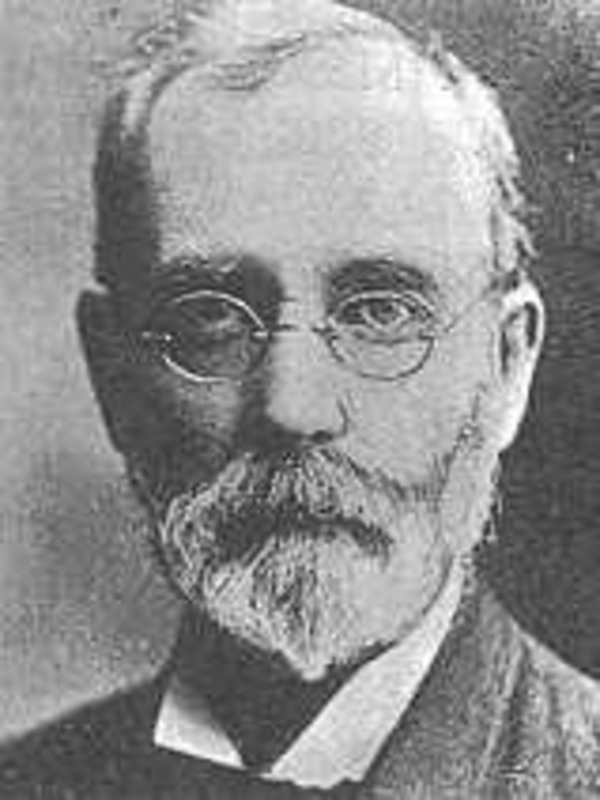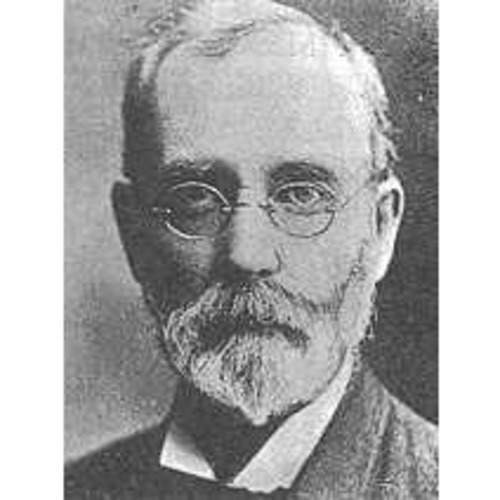
Source: Link
PELLETIER, ROMAIN-OCTAVE (baptized Jean-Romain-Octave), organist, pianist, notary, professor, and musicographer; b. 9 Sept. 1843 in Montreal, son of Jean-Baptiste-Généreux Peltier, a notary, and Marie-Scholastique Masson; m. 8 June 1869 Athaïs Le Maire in Saint-Benoît (Mirabel), Que., and they had four sons and three daughters; d. 4 March 1927 in Montreal.
Even as a child Romain-Octave Pelletier had an exceptional musical ear. Without having studied music, he began to play the organ and he accompanied hymns and masses. Feeling embarrassed at not being able to read a score set before him, he is said to have learned musical notation in two days and then taken a few lessons from his brother Orphir Peltier*, who was an organist. In large part a self-taught musician, he was appointed organist at the Montreal Roman Catholic cathedral (which would become the basilica of Marie-Reine-du-Monde) in 1860, at the age of 17. He held this position for a few years, and again from 1887 to 1923. Along with his musical activities, he attended the Petit Séminaire de Montréal from 1854 to 1859, and then studied at the Collège Sainte-Marie to become a notary. He obtained his licence in 1864 but practised his profession only briefly. He went against the wishes of his family and the spirit of the times in abandoning this liberal profession to devote himself exclusively to music.
After spending some time, around 1865–67, in Hartford, Conn., where he was hired as organist at the cathedral, Pelletier returned to Montreal. He earned a living by teaching music and as a pianist accompanying a number of performers – among them Frantz Jehin-Prume* – on the concert stage. He also played the organ at the church of Saint-Jacques (probably between 1869 and 1875); there he went against the musical practices of his time by introducing serious sacred music such as the works of Bach, a Protestant composer whose music seemed too austere for Catholic churches. He was thus the moving spirit behind the reform of the repertoire of religious music used in Montreal churches.
In 1869 Pelletier married Athaïs Le Maire, daughter of Félix-Hyacinthe Lemaire*, a notary and legislative councillor, and Luce-Artémise Barcelo. He went to London two years later to study with George Cooper, the organist at the Chapel Royal. He then moved on to Paris, where he met Camille Saint-Saëns and Charles-Marie Widor, and finally to Brussels to work with Jaak Nikolaas Lemmens. The few months he spent abroad gave him the chance, in particular, to become familiar with the style of French church organists, who used the organ, not simply as an accompaniment, but to play, in turn, preludes, postludes, and versets with the choir. On his return to Montreal he accepted a position as music teacher (vocal music, plainsong, piano, harmonium) at the École Normale Jacques-Cartier, where he taught from 1876 to 1917. From then on the teaching of piano and organ held a central place in his professional activities. He gave private lessons and taught in other institutions as well, including Mont Sainte-Anne in Lachine, which was run by the Sisters of St Anne, and, in Montreal, the Asile Nazareth, the convent of the Sisters of the Holy Names of Jesus and Mary, and the McGill Conservatorium of Music, where he was professor of piano from 1904 to 1907. In 1900, during a second visit to Paris, he met the famous organists Alexandre Guilmant and Eugène Gigout. He was president of the Académie de Musique de Québec for many years (1884–85, 1894–95, 1902–4, 1909–10, and 1915–16). He also inaugurated a number of organs in the province of Quebec, including those in Beauport, Sainte-Marie (in the Beauce), and Varennes.
Romain-Octave Pelletier retired from the cathedral in 1923, and his musical career was crowned two years later with the conferring of an honorary doctorate by the Université de Montréal. He taught music for half a century, and his students included Claude Champagne*, Alfred Laliberté, and Albertine Labrecque (Morin). A professional musician, he was able to give them a sound and rigorous training. In reforming church music, he was uncompromising in matters of art.
Although his music was generally improvised, Romain-Octave Pelletier left several not very innovative musical works and a number of theoretical treatises on music. Some of his compositions have been lost; the others are preserved in the Villeneuve collection at the Bibliothèque de Musique de la Univ. de Montréal and in the Music Div. of the LAC. As a musicographer, Pelletier published several instructional works: Mécanisme du piano, ou, nouvelles études techniques destinées aux élèves avancés (Québec, [1880?]); Le toucher du pianiste (Montréal, 1916; réimpr., 1928) (a summary of lectures given to the nuns of the Congregation of Notre-Dame); L’étude de la littérature du piano ([Montréal, 1920?]) (lectures given at Mont Sainte-Anne, in Lachine); L’art pianistique (s.l., [1922]); Guide du professeur de piano par questions et réponses ([Montréal?], 1925) (prepared for the Sisters of the Holy Names of Jesus and Mary). Around 1881–82 he wrote several articles on the construction and playing of the organ in the Revue canadienne (Montréal).
ANQ-M, CE601-S51, 11 sept. 1843; CE606-S9, 8 juin 1869. ANQ-Q, P379-1. Le Devoir, 5, 7, 12 mars 1927. Centenaire de la paroisse St-Jacques de Montréal: église de l’Expo 67, église du métro ([Montréal?, 1966?]). Jean Cinq-Mars, Histoire du collège Sainte-Marie de Montréal, 1848–1969 (Montréal, 1998). Le diocèse de Montréal à la fin du dix-neuvième siècle . . . (Montréal, 1900). Encyclopedia of music in Canada (Kallmann et al.). Olivier Maurault, Saint-Jacques de Montréal: l’église, la paroisse (Montréal, 1923). Montreal Urban Community, Planning Dept. of the Territory, Architecture religieuse (2v., Montréal, 1981–84), 1 (Les églises). Romain Pelletier, “Octave Pelletier, organiste et pédagogue (1843–1927),” Qui? (Montréal), 4 (1952–53): 3–24. Pierre Quenneville, “Guillaume Couture (1851–1915): l’éducateur, le directeur artistique et le musicien d’église” (thèse de phd, univ. de Montréal, 1988).
Cite This Article
Pierre Vachon, “PELLETIER, ROMAIN-OCTAVE (baptized Jean-Romain-Octave),” in Dictionary of Canadian Biography, vol. 15, University of Toronto/Université Laval, 2003–, accessed March 1, 2026, https://www.biographi.ca/en/bio/pelletier_romain_octave_15E.html.
The citation above shows the format for footnotes and endnotes according to the Chicago manual of style (16th edition). Information to be used in other citation formats:
| Permalink: | https://www.biographi.ca/en/bio/pelletier_romain_octave_15E.html |
| Author of Article: | Pierre Vachon |
| Title of Article: | PELLETIER, ROMAIN-OCTAVE (baptized Jean-Romain-Octave) |
| Publication Name: | Dictionary of Canadian Biography, vol. 15 |
| Publisher: | University of Toronto/Université Laval |
| Year of publication: | 2005 |
| Year of revision: | 2005 |
| Access Date: | March 1, 2026 |



